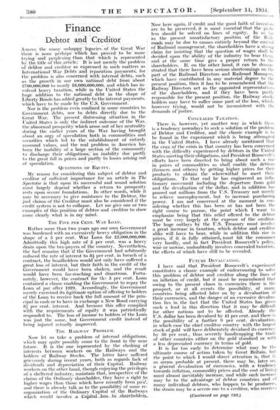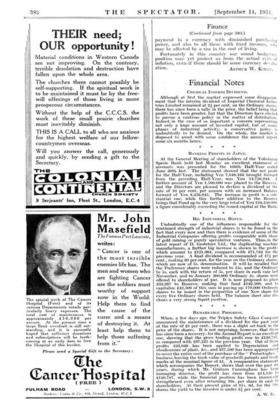Finance :Debtor and Creditor •
Amoxo the many , unhappy' legacies.. of _the Great War there is none -perhaps• which has pro- to:be more trying-and perplexing.. than . that _ represented by the title of this artiele:s.It is not-Merely the problem of delitor and, creditor as- expressed in. such -matters as International War. Debts and reparation payments', for the problem is also concerned With. internal- debts, such as the growth `iii our own 'national debt fibril about £700,000,000 to nearly £8,000,000,000, and which has in- volved heavy taxation, while in the United States the huge addition to the national. debt in the shape of Liberty Bonds has added greatly to the interest payments, which have to be made by the,U.S. Government.
Nor is the problem even confined in some countries to Government debts, nor todebtS- directly due to the Great War. The present distressing situation - in . the United 'States is only the indirect outcome of the War, the abnorthal prosperity which arose out of her neutrality . during the earlier years of, the War having brought . about_ an orgy of speculation bOth in commodities and .; securities which led to the establishment of entirely unsound values, and the real problem in AmeriCa has , been the inability of a large section of the. community to discharge their obligations, an inability due. partly , to the great fall in prices and 'partly to losses arising out of speculation.
QUESTIONS OF EQUITY.
My reason for considering this subject of debtor and creditor of sufficient importance for an article in The Spectator is that upon its successful and sound solution must largely depend whether a return to prosperity rests upon secure foundations. In other words, while it may be necessary to give assistance to the Debtor, the just claims of the Creditor must also be considered if the credit system is not to collapse. Let me give one or two examples of this position of debtor and creditor to show more clearly what is in my mind.
THE FIVE PER CENT. WAR LOAN.
Rather more than two years ago our own Government was burdened with an excessively heavy obligation in the shape of a 5 per cent. War- -Loan for £2,000,000,000. Admittedly this high rate. of 5 :per cent. was a heavy drain upon the tax-payers of the country. Nevertheless, the fact remains that if the "GOvernment had arbitrarily reduced the rate of interest to 8 -per cent. in breach of a contract, the bondholders would not only have suffered a great loss of interest, but their faith, in the credit of the Government would haVe been shaken; and the result would have- been' far-reaching and diSastrons. Fortu- nately, however, the contract for the 5 per cent. Loan contained a clause enabling the Government to repay the Loan at par after 1929. - Accordingly, the Government merely exercised its legitimate option of offering to holders of the Loan to receive back the full amount of the prin- cipal in cash or to have in exchange a New Bond carrying 3.4 per cent. interest. And because this. offer complied with the requirements of equity it was patriotically responded to. The-loss of income to holders of the Loan was just the same, but Government credit- instead of being injured actually improved.
THE RAILWAY PROBLEM.
Now let us take a problem of internal obligations, which may quite possibly come to the front in the near. future., It is the one represented by the clashing of interests between workers on the Railways and the holders of Railway Stocks. -The latter have suffered grievously during recent years, both as regards lack of dividends and depreciation of their Capital. Railway workers on the other hand, though enjoying the privileges of a sheltered industry, maintain that, irrespective of the claims of the Ordinary shareholder, they have a- right to higher wages than those which have recently been .paY,' and there is already talk as to the possibility of some re- organization of the Ordinary -Capital of.,: the Railways; which would involve, _a, _.Capit01 inqs _sbarehohleta, Now here again, if credit and the good faith of investors are to be preserved, it is most essential that the prob- lem should be solved on lines of equity. In so far as the present unsatisfactory position of the Rail- rs may be due to causes entirely beyond the control of Railroad management, the shareholders have a strong claim for insisting that the question of wages shall be decided upon the ability of the industry to bear them, and at the same time give a proper return to the shareholders. If, on the other hand, it can be demon- strated that there have been serious shorteinnings on the part of the Railroad Directors and Railroad Managers, which have contributed in any material degree to the present position, then it has to be remembered that the Railway Directors act as the appointed representatives of the • shareholders, and if they have been partly reSponsible for the present position, the Railway stock- holders may have to suffer some part of the loss, which, hoWever trying, would not be inconsistent with the demands of justice.
CONCEALED TAXATION.
There is, however, yet another way in which there is a-tendency nowadays to seek a solution of the problem of Debtor and Creditor, and the classic example is to be found in the experiment which is being attempted in the United States. I have already mentioned that the crux of the crisis in that country has been concerned With the. difficulty experienced by debtors in the United States meeting their obligations, and President Roosevelt's efforts have been directed to bring about such a rise in prices of commodities as shall enable the debtors (farmers and others) by getting higher 'prices for their products to obtain the wherewithal to meet their obligations. To that end he has engineered an infla- tionary movement including the departure from gold and the devaluation of the dollar, and in addition has poured out millions from the U.S. Treasury not merely to relieve unemployment, but to increase purchasing power. I am not concerned at the moment in con- sidering whether this has been or has not been the right course to pursue, the point which I want to emphasize being that this relief offered to the debtor must be very largely at the expense of the creditor. The huge outlays by the U.S. Treasury must involve a great increase in taxation, which debtor and creditor alike' will have to bear, while in addition this rise in prices, if it, is.. fully attained, must hit the consumer very hardly, and in fact President Roosevelt's policy, wise or unwise, undoubtedly:involves concealed taxation, the effects of which have still to be revealed.
FUTURE DEVALUATION.
I have said that President Roosevelt's experiment constitutes a classic example of endeavouring to solve this problem of debtor and creditor along the lines of an inflation. of credit, but it must be remembered that owing to the present chaos in currencies there is the prospect, or at all events the possibility, of many countries being affected later on by a devaluation of their currencies, and the danger of an excessive devalua- tion lies in the fact that the United States has given such a lead in this direction that it may be difficult for other nations not to be affected. Already the U.S. dollar has been devalued by 41 per cent. and there is the possibility of a further 9 per cent. devaluation. in which case the chief creditor country with the largest stock of gold will have deliberately devalued its currency by 50 per cent.; thus severely- handicapping the trade of other' countries either on.-the gold 'standard or- with a less depreciated currency in terms of gold. It is. far too early to determine what may be the ultimate course of action taken by Great Britain, but. the point to which I would direct attention is, that if, as seems probable at present, there may be, later on,., a general devaluation of ;Currencies, with a• tendency towards inflation, commodity prices and the cost of living mutt alinOst inevitably increase,-and while such increase, may be to the advantage of debtor countries and of- many individual debtors, who happen to be producers, the strain may be a severe one to a creditor, who receives (Continued on page 282.)
Finance
(Continued from page 380.) payment in a currency with diminished purchasing power, and also to all -those with fixed incomes, who may be affected by a rise in the cost of living.
Fortunately in this country our sound budgetary position may yet protect us from the actual evils of inflation, even-if there should be some currency devalu. ation.
ARTHUR W. KIDDY.











































 Previous page
Previous page